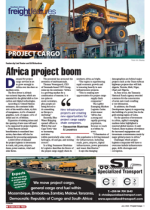The carbon footprint of project cargo is coming under scrutiny through regulations which are forcing companies to track and report on the total impact of their products, which includes all stages of logistics.A survey conducted by McKinsey in June 2023 found 46% of global institutional investors interviewed saw navigating the low-carbon transition as their most important investment priority in the next three years.For project cargo, this means overcoming the challenges of reducing emissions from the shipping, and landside transport of cargo.Shipping is under scrutiny because it accounts for around 3% of global carbon emissions.A shipping decarbonisation survey BCG published in March 2024 found 80% of shipping customers were prepared to pay a premium for green shipping, with the average premium at 4% — an increase of 33% from 2022 and double the rate of 2021.The automotive and healthcare industries are paying the highest premiums, at 6.1% and 6%, respectively.The decarbonisation of shipping is facing headwinds, however.A survey by T&E found that, while 4% of European shipping could run on new energy fuels by 2030, just a third of the green hydrogen projects are guaranteed.“Shipping has a chicken-and-egg problem. E-fuels producers are waiting for clearer demand signals from ship operators before making large investments,” stated Inesa Ulichina, shipping officer at T&E. “Shipping operators, on the other hand, are waiting for these fuels to scale up and become cheaper before signing offtake agreements.”Road freight emissions are also being targeted.While heavy trucks and buses represent around 3% of vehicles on the world’s roads, they are responsible for 30% of road transport emissionsThe Paris Agreement target is for the sector to reduce its global carbon footprint by 80% in less than 30 years.More pressingly, the sector’s emission intensity should decline by around 30% before 2030. “Despite the decarbonisation barriers, road freight leaders believe that a zero-emission technology pathway is emerging that includes both hydrogen and battery electric vehicles, with both starting to enter the global f leet at scale in the coming decade,” according to Tarek Helmi, partner, Deloitte Netherlands.Project cargo companies can take the high road by focusing on ways to reduce the carbon footprint of projects.Viable routes to logistics decarbonisation are opening up as technology solutions become more widespread and affordable, according to McKinsey, which estimates that a 40 to 50% reduction in logistics emissions by 2030 is achievable using technology that is available today.

